Post Graduate Acceptance Letter
[Your Name]
[Your Address]
[City, State, ZIP Code]
[Email Address]
[Phone Number]
[Date]
[Admission Committee/Graduate Program Director]
[University/College Name]
[Address]
[City, State, ZIP Code]
Dear [Admission Committee/Graduate Program Director],
Subject: Acceptance of Postgraduate Admission Offer
I hope this letter finds you well. I am writing to express my heartfelt gratitude for extending an offer of admission to the [Name of Postgraduate Program] at [University/College Name]. I am absolutely thrilled and honored to accept this wonderful opportunity to pursue my postgraduate studies at your esteemed institution.
I have carefully reviewed the details of the admission offer and the curriculum for the [Name of Postgraduate Program]. After thorough consideration, I firmly believe that this program aligns perfectly with my academic and professional aspirations. It presents an ideal platform for me to gain in-depth knowledge, refine my skills, and contribute meaningfully to the field of [Your Field of Study].
I would like to take this opportunity to thank the admission committee for considering my application and recognizing my potential. I am eager to learn from the distinguished faculty members and collaborate with my fellow students who share similar academic interests. I am confident that the stimulating academic environment and resources at [University/College Name] will facilitate my growth and development both academically and personally.
I understand the responsibilities and commitments that come with being a part of this prestigious postgraduate program. Rest assured, I am dedicated to putting forth my best efforts to excel in my studies and actively participate in various academic and extracurricular activities.
To confirm my acceptance, I have attached all the required documents as indicated in the admission offer, including the signed acceptance form and the necessary financial arrangements. I will promptly complete any additional paperwork required for enrollment and abide by the institution's guidelines.
Once again, I would like to express my sincere gratitude for granting me this opportunity. I am excited to embark on this new journey at [University/College Name] and contribute positively to its academic community.
Thank you for your trust in my potential. I am looking forward to commencing my postgraduate studies in [Semester/Year], and I can't wait to be a part of the vibrant academic community at [University/College Name].
Please feel free to reach out to me if you require any further information or documentation. I am available at [Email Address] and [Phone Number].
Yours sincerely,
[Your Name] (printed)
[Your Signature] (if submitting a physical letter)
Standard Post Graduate Acceptance Letter
Dear [Recipient's Name],
Subject: Acceptance of Admission to [Program Name]
I am writing to formally accept my offer of admission to the [Program Name] at [University Name] for the [Academic Year/Semester] intake. I am honored to have been selected for this program and eagerly look forward to beginning my postgraduate studies.
I confirm my acceptance of the terms and conditions outlined in the admission letter dated [Date]. I understand the program will commence on [Start Date], and I am prepared to fulfill all enrollment requirements by [Deadline].
Please find attached the completed acceptance form, proof of payment for the enrollment deposit, and any other required documentation. I would appreciate confirmation of receipt and any additional information regarding orientation, housing, or registration procedures.
Thank you for this incredible opportunity. I am excited to contribute to the academic community at [University Name] and to pursue my academic goals under the guidance of your distinguished faculty.
Sincerely,
[Your Full Name]
[Student ID, if assigned]
[Contact Information]
Acceptance with Request for Deferral Letter
Dear [Admissions Committee/Specific Name],
Subject: Acceptance of Admission with Deferral Request for [Program Name]
I am delighted to accept my offer of admission to the [Program Name] at [University Name]. This opportunity represents a significant milestone in my academic journey, and I am genuinely excited about joining your program.
However, I am writing to request a deferral of my enrollment from [Original Intake] to [Desired Intake]. Due to [brief explanation: family circumstances/professional commitment/health reasons/research opportunity], I believe postponing my start date would allow me to begin the program with full commitment and focus.
I have thoroughly reviewed the deferral policy outlined in the admission materials and understand that [mention any conditions, fees, or requirements]. I am prepared to submit any necessary documentation and meet all requirements to formalize this deferral request.
I remain fully committed to attending [University Name] and am confident that this deferral will enable me to maximize my contribution to the program. I would be grateful for your consideration of this request and look forward to your response.
Thank you for your understanding and flexibility.
Warm regards,
[Your Full Name]
[Application/Student ID]
[Contact Information]
Acceptance with Financial Aid Inquiry Email
Dear [Financial Aid Office/Admissions Officer Name],
Subject: Acceptance of Admission and Financial Aid Inquiry - [Program Name]
I am thrilled to accept my offer of admission to the [Program Name] at [University Name] for [Academic Year]. This program perfectly aligns with my academic aspirations, and I am honored to join your academic community.
While I am committed to enrolling, I am writing to inquire about additional financial aid opportunities that may be available. The current financial aid package, while appreciated, presents some challenges given [brief context: family circumstances/cost of living/other commitments]. I am exploring all possible avenues to make this educational investment feasible.
Could you please provide information about:
- Additional scholarship opportunities for incoming students
- Graduate assistantship or research positions
- Payment plan options or installment arrangements
- External funding resources you might recommend
I am prepared to submit any additional documentation required for financial aid consideration. My commitment to academic excellence and contributing meaningfully to the program remains unwavering.
Thank you for your assistance in this matter. I look forward to hearing from you.
Best regards,
[Your Full Name]
[Student ID]
[Contact Information]
Enthusiastic Acceptance with Research Interest Email
Dear Professor [Supervisor's Name] and Admissions Committee,
Subject: Acceptance of Admission - [Program Name] and Research Collaboration Inquiry
I am absolutely delighted to accept my admission offer to the [Program Name] at [University Name]! This opportunity to study under world-class faculty and engage with cutting-edge research is truly a dream come true.
I am particularly excited about the possibility of working with Professor [Name] in the area of [Research Field/Topic]. Having read several of your recent publications, especially [mention specific paper if applicable], I am inspired by your work on [specific topic]. I believe my background in [relevant experience] would allow me to contribute meaningfully to ongoing research projects.
I have completed all acceptance formalities, including the enrollment deposit and required documentation. I would welcome the opportunity to discuss potential research assistantships or collaboration opportunities at your earliest convenience.
Thank you for believing in my potential. I cannot wait to begin this exciting chapter and contribute to the vibrant academic environment at [University Name].
With great enthusiasm,
[Your Full Name]
[Student ID]
[Contact Email and Phone]
Professional and Concise Acceptance Email
Dear [Admissions Office],
Subject: Formal Acceptance - [Program Name], [Academic Year]
I am writing to formally accept my offer of admission to the [Program Name] at [University Name], commencing [Start Date].
All required documentation, including the completed acceptance form and enrollment deposit of [Amount], has been submitted as of [Date]. Please confirm receipt at your earliest convenience.
Kindly provide information regarding next steps, including registration dates, orientation schedules, and any outstanding requirements.
Thank you for this opportunity.
Professionally,
[Your Full Name]
[Student ID]
[Contact Information]
Acceptance with Housing Request Letter
Dear [Housing Office/Admissions Committee],
Subject: Acceptance of Admission and On-Campus Housing Application
I am pleased to formally accept my admission to the [Program Name] at [University Name] for the [Semester/Year] intake. I am genuinely excited to join your academic community and begin this transformative educational experience.
As an international student/out-of-state student relocating to [City], I am writing to inquire about on-campus housing options. I would greatly appreciate your assistance with the housing application process and information regarding:
- Available graduate housing facilities
- Application deadlines and procedures
- Housing costs and payment schedules
- Move-in dates and orientation for new residents
I am particularly interested in [specific preference: single occupancy/shared accommodation/family housing] and would be grateful for any guidance you can provide. I am prepared to submit all necessary applications and documentation promptly.
Thank you for your support during this transition. I look forward to calling [University Name] my new academic home.
Sincerely,
[Your Full Name]
[Student ID]
[Current Address]
[Contact Information]
Acceptance from International Student with Visa Inquiry
Dear [International Student Office/Admissions],
Subject: Acceptance of Admission and I-20/Visa Documentation Request
I am honored to accept my offer of admission to the [Program Name] at [University Name] for [Academic Year]. As an international student from [Country], I am thrilled about the opportunity to pursue my postgraduate studies at your prestigious institution.
To proceed with my visa application, I kindly request the following documentation:
- I-20 form (for F-1 visa) or DS-2019 (for J-1 visa)
- Official admission letter for visa purposes
- Financial documentation requirements
- Any additional forms required for international students
I have completed all acceptance requirements, including payment of the enrollment deposit and SEVIS fee (if applicable). My passport details are: [Passport Number], valid until [Date].
Could you please also provide information regarding:
- Estimated timeline for receiving visa documents
- Pre-departure orientation for international students
- Airport pickup services or arrival assistance
Thank you for your assistance in facilitating this process. I am eager to begin my studies and contribute to the diverse community at [University Name].
Best regards,
[Your Full Name]
[Application ID]
[Passport Number]
[Contact Information]
Conditional Acceptance with Pending Requirements Email
Dear [Admissions Committee],
Subject: Acceptance of Conditional Admission Offer - [Program Name]
Thank you for the conditional offer of admission to the [Program Name] at [University Name]. I am delighted to accept this offer and am fully committed to meeting all outstanding requirements by the specified deadlines.
I understand that my admission is contingent upon:
[List the specific conditions, such as:
- Completion of current degree program with minimum GPA of [X.X]
- Submission of final transcripts by [Date]
- English language proficiency test scores by [Date]
- Any other specified requirements]
I am on track to fulfill these requirements and will ensure all documentation reaches your office by [Date]. My current academic standing is [provide relevant update], and I am confident in meeting the conditions outlined.
Please confirm receipt of this acceptance and provide any additional guidance regarding the conditional admission process. I am prepared to maintain regular communication to ensure a smooth transition to full admission status.
Thank you for your confidence in my potential. I look forward to joining [University Name].
Respectfully,
[Your Full Name]
[Application/Student ID]
[Contact Information]
What is a Post Graduate Acceptance Letter and Why is it Needed
A post graduate acceptance letter is a formal written communication sent by an admitted student to a university or academic institution to confirm their intention to enroll in a graduate program. This document serves as a binding commitment between the student and the institution, finalizing the admission process.
Key purposes include:
- Formally securing your place in the program before enrollment deadlines
- Triggering administrative processes such as course registration, housing allocation, and visa documentation
- Demonstrating professionalism and commitment to the academic institution
- Providing written confirmation that protects both parties' interests
- Enabling the institution to finalize cohort numbers and allocate resources appropriately
- Creating an official record of acceptance for financial aid, scholarship processing, and other administrative needs
When Should You Send a Post Graduate Acceptance Letter
Timing is critical for acceptance letters. Send them:
- Immediately after making your decision, ideally within 1-2 weeks of receiving the offer
- Before the acceptance deadline specified in your admission letter (typically 2-8 weeks from offer date)
- After comparing offers from multiple institutions if you've applied to several programs
- Once you've secured necessary financial arrangements or funding confirmation
- After resolving any conditional requirements if you received conditional admission
- When you've made preliminary arrangements for relocation or housing
- Before acceptance deadlines to avoid losing your spot to waitlisted candidates
- After receiving responses to any inquiries about deferrals, financial aid, or program specifics
- During business hours on weekdays for faster processing
- With sufficient time to handle visa applications if you're an international student
Who Should Send a Post Graduate Acceptance Letter
The letter should come from:
- The admitted student themselves, not parents or guardians (unless exceptional circumstances exist)
- A legal representative if the student has documented special circumstances
- The primary applicant in cases of joint programs or coupled admissions
Key considerations:
- Students must use the same name that appears on official application documents
- The letter should reference the application or student ID number provided in the admission offer
- Communication should come from the email address used during the application process
- For sponsored students, acknowledgment of sponsorship may be included but acceptance remains the student's responsibility
To Whom Should the Letter Be Addressed
Primary recipients:
- The Graduate Admissions Office or Office of Graduate Studies
- The specific admissions officer or director named in your admission letter
- The program coordinator or department head for specialized programs
- The International Student Office (for international applicants requiring visa documentation)
- The Financial Aid Office (if acceptance involves scholarship or funding matters)
Important addressing protocols:
- Use the exact title and name provided in your admission correspondence
- Include department names and mailing addresses as specified
- Copy relevant offices when multiple departments need notification (admissions, housing, financial aid)
- For email submissions, use professional email addresses and clear subject lines
Requirements and Prerequisites Before Sending Your Acceptance
Essential checklist before sending:
- Carefully review all terms and conditions in your admission offer
- Verify acceptance deadlines and ensure you're responding in time
- Confirm program start dates, orientation schedules, and key academic calendar dates
- Check enrollment deposit amounts, payment methods, and due dates
- Gather required supporting documents (ID copies, transcripts, test scores)
- Review financial aid packages and understand payment obligations
- Research housing options and application deadlines if needed
- Verify visa requirements and documentation timelines for international students
- Decline offers from other institutions professionally once you've made your decision
- Confirm your contact information is current and accessible
- Prepare questions about next steps, registration, or orientation
- Save copies of all correspondence for your records
- Understand deferral policies if you need to postpone enrollment
- Review academic integrity policies, honor codes, and student conduct expectations
How to Write and Send Your Acceptance Letter
Writing process:
- Start with a clear subject line identifying the purpose (e.g., "Acceptance of Admission - MBA Program 2025")
- Open with a direct statement of acceptance including program name and start date
- Express genuine enthusiasm while maintaining professionalism
- Confirm understanding of key terms, deadlines, and financial obligations
- Address any special circumstances or requests (deferral, housing, visa documents)
- Mention attached documents or completed requirements
- Request confirmation of receipt and information about next steps
- Close with appropriate professional language
- Proofread carefully for errors in names, dates, program titles, and grammar
Sending methods:
- Email is most common and allows for quick confirmation
- Some institutions require completing an online acceptance portal
- Follow specific instructions provided in your admission letter
- Send during business hours for faster response
- Keep copies of all sent correspondence
- Follow up if you don't receive confirmation within 3-5 business days
Formatting Guidelines and Etiquette
Length and structure:
- Keep the letter concise: 200-400 words for standard acceptance
- Longer letters (400-600 words) acceptable when including special requests
- Use clear paragraphs with single spacing
- Include all necessary contact information
Tone and style:
- Professional and formal for standard acceptances
- Enthusiastic but not overly casual
- Direct and clear in stating your acceptance
- Respectful when making requests or inquiries
- Confident and committed in tone
Technical formatting:
- Use a professional email signature
- Standard business letter format for printed versions
- Clear subject lines for emails
- Proper salutations and closings
- Attachment names should be descriptive (e.g., "Acceptance_Form_YourName.pdf")
Mode of sending:
- Email is standard unless otherwise specified
- Some institutions require portal submissions
- Certified mail for printed letters if documentation is critical
- Keep delivery confirmation for important deadlines
After Sending: Follow-Up Actions
Immediate follow-up:
- Request and await confirmation of receipt (usually within 3-5 business days)
- Save confirmation emails or reference numbers
- Monitor your email regularly for additional instructions
- Check your application portal for status updates
Short-term actions (1-4 weeks):
- Complete enrollment deposit payment if not already done
- Submit any outstanding documentation requested
- Apply for on-campus housing if desired
- Register for orientation sessions
- Connect with the international student office for visa processing
- Explore graduate assistantship or funding opportunities
- Begin researching course offerings and academic advisors
Long-term preparation (1-6 months before start):
- Attend virtual or in-person orientation events
- Complete mandatory training modules or health requirements
- Arrange transportation and accommodation
- Connect with future classmates through official channels
- Review program handbooks and academic policies
- Prepare for any placement tests or preliminary assessments
Common Mistakes to Avoid
Critical errors:
- Missing the acceptance deadline, resulting in forfeited admission
- Failing to pay enrollment deposits on time
- Not declining other offers, leading to ethical concerns and wasted opportunities for others
- Accepting multiple offers simultaneously (unethical and may result in rescinded admissions)
- Using informal or casual language in official correspondence
- Forgetting to attach required documents or forms
- Providing incorrect personal information or student ID numbers
- Not requesting confirmation of receipt
- Assuming acceptance is complete without fulfilling conditional requirements
- Neglecting to inform financial aid or scholarship offices of acceptance
- Missing visa application deadlines due to delayed acceptance
- Not reading the fine print regarding withdrawal policies or enrollment obligations
- Sending acceptance to the wrong department or office
- Using unprofessional email addresses
- Making demands rather than polite requests when inquiring about additional information
Essential Elements and Structure
Mandatory elements:
- Clear statement of acceptance with program name and start date
- Your full legal name as it appears on application documents
- Student or application ID number
- Date of the letter
- Acknowledgment of terms and conditions
- Professional contact information
- Signature (typed for emails, handwritten for printed letters)
Recommended inclusions:
- Expression of gratitude and enthusiasm
- Confirmation of enrollment deposit payment or timeline
- Request for confirmation of receipt
- Questions about next steps or additional requirements
- Reference to attached documents
Common attachments:
- Completed acceptance forms
- Proof of enrollment deposit payment
- Copies of identification documents
- Signed agreements or honor code acknowledgments
- Housing applications
- International student documentation
- Updated transcripts if required
Advantages and Disadvantages of Different Acceptance Approaches
Prompt acceptance benefits:
- Secures your place in competitive programs
- Allows adequate time for visa processing and relocation planning
- Demonstrates strong interest and commitment
- Provides peace of mind and reduces stress
- Enables early housing selection and better options
Delayed acceptance risks:
- May lose your spot to waitlisted candidates
- Creates time pressure for visa applications and logistics
- Limited housing availability
- Rushed preparation and orientation
- Potential administrative complications
Accepting with conditions/requests:
- Advantages: Addresses legitimate concerns, shows thoughtful planning, may result in better support
- Disadvantages: May delay final confirmation, requires additional correspondence, could complicate enrollment if requests are denied
Comparing Acceptance Letters with Similar Communications
Acceptance vs. Letter of Intent:
- Acceptance letter is binding and confirms enrollment
- Letter of intent expresses interest but isn't always binding
- Acceptance triggers administrative processes; intent letters may not
Acceptance vs. Enrollment Confirmation:
- Acceptance is the initial confirmation of your decision
- Enrollment confirmation occurs after completing registration and paying fees
- Acceptance is typically earlier in the timeline
Email vs. Formal Letter:
- Emails are faster and allow easy tracking
- Formal letters may be required by traditional institutions
- Portal submissions are increasingly common and most efficient
Standard vs. Conditional Acceptance:
- Standard acceptance requires no additional academic requirements
- Conditional acceptance depends on meeting specific criteria
- Both require formal acceptance letters but with different commitments
Tips and Best Practices
Strategic advice:
- Respond promptly but not hastily—take time to review all details
- Keep a checklist of all deadlines and requirements
- Create a dedicated folder for all admission correspondence
- Set reminders for important dates and follow-ups
- Use templates but personalize each letter
- Be honest about circumstances requiring deferrals or special arrangements
- Build positive relationships with admissions staff through professional communication
- Join official student groups or forums to connect with future classmates
- Research your program thoroughly before accepting to ensure it's the right fit
- Consider geographic, financial, and career implications before finalizing
- Don't hesitate to ask questions—admissions staff expect and welcome them
- Maintain professionalism even when excited or anxious
- Double-check all dates, names, and program details before sending
- Keep digital and physical copies of all documents
- Start preparing mentally and logistically for the transition immediately after acceptance
Frequently Asked Questions
Can I accept multiple offers simultaneously? No, this is unethical and violates academic integrity standards. Accept only the program you intend to attend and decline other offers promptly.
What if I miss the acceptance deadline? Contact the admissions office immediately. Some institutions may grant extensions, but your spot is not guaranteed if the deadline passes.
Do I need to send a physical letter or is email sufficient? Most institutions accept email submissions. Follow the specific instructions in your admission letter.
How long does it take to receive confirmation? Typically 3-5 business days. If you don't receive confirmation, follow up with the admissions office.
Can I change my mind after accepting? Yes, but policies vary. Review withdrawal policies carefully, as enrollment deposits are usually non-refundable.
Should I accept before securing funding? This depends on your financial situation. Some students accept conditionally while exploring funding, but be prepared to fulfill financial obligations if funding doesn't materialize.
What if I'm on a waiting list for my preferred program? You may accept a confirmed offer while remaining on a waitlist elsewhere, but inform both institutions professionally if your status changes.
Is a confirmation email legally binding? Yes, acceptance emails are generally considered binding commitments, similar to contracts.

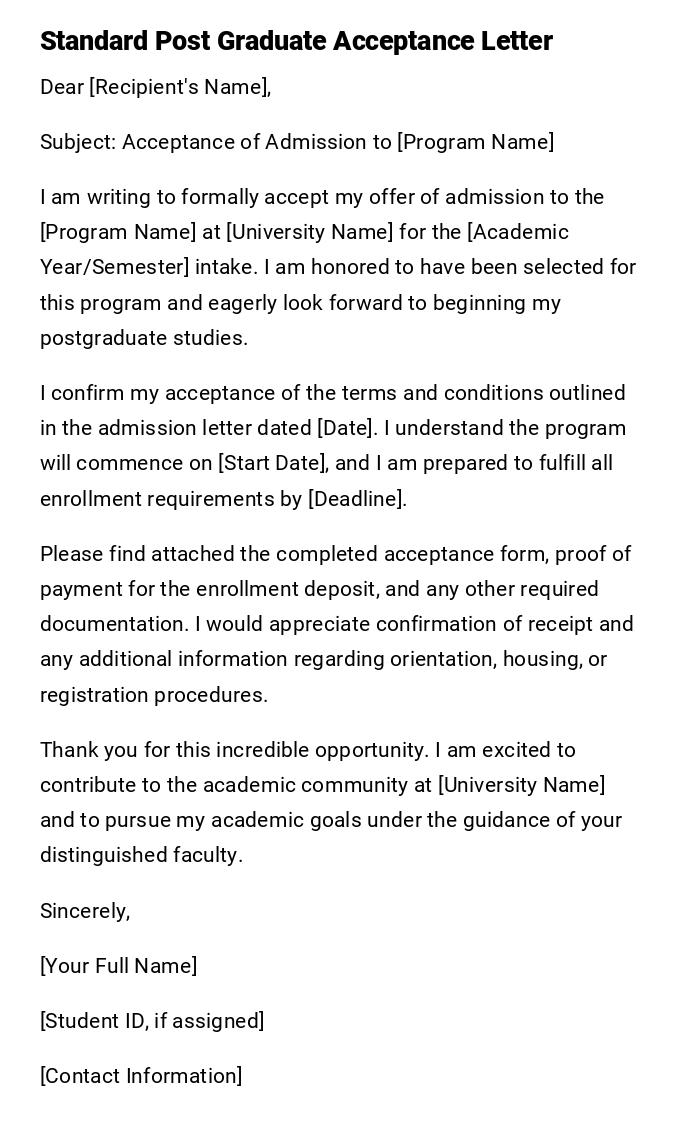
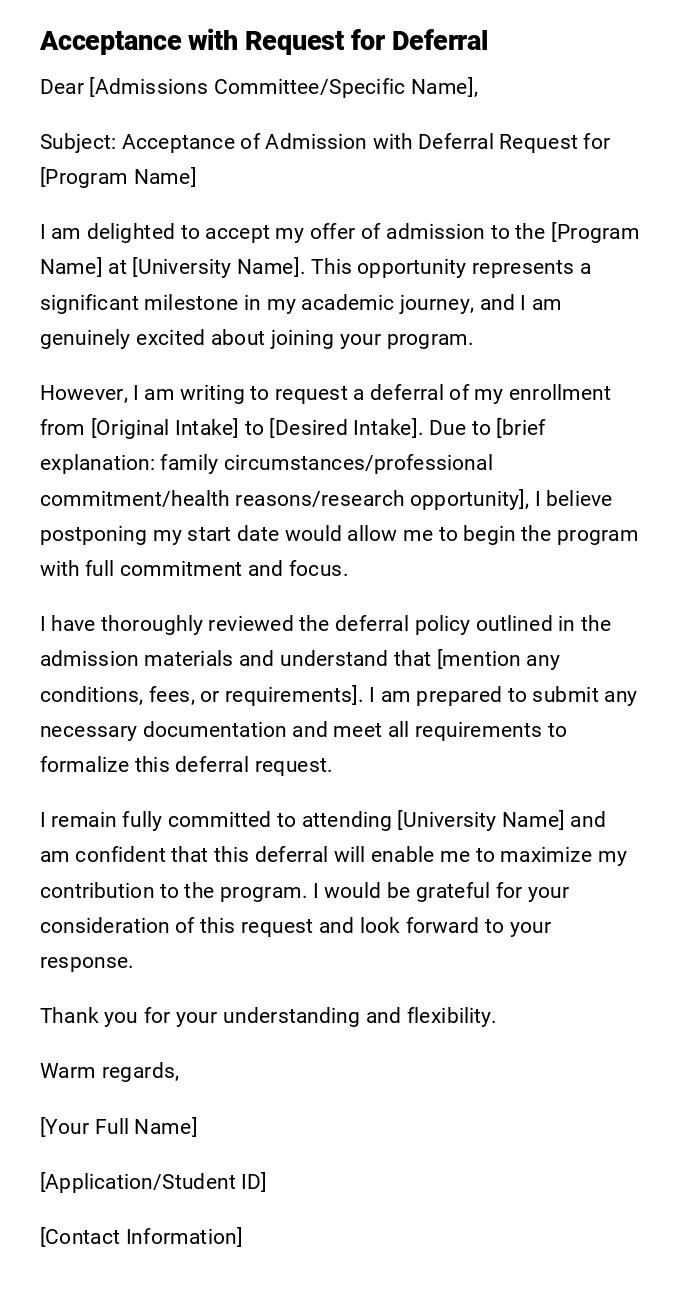
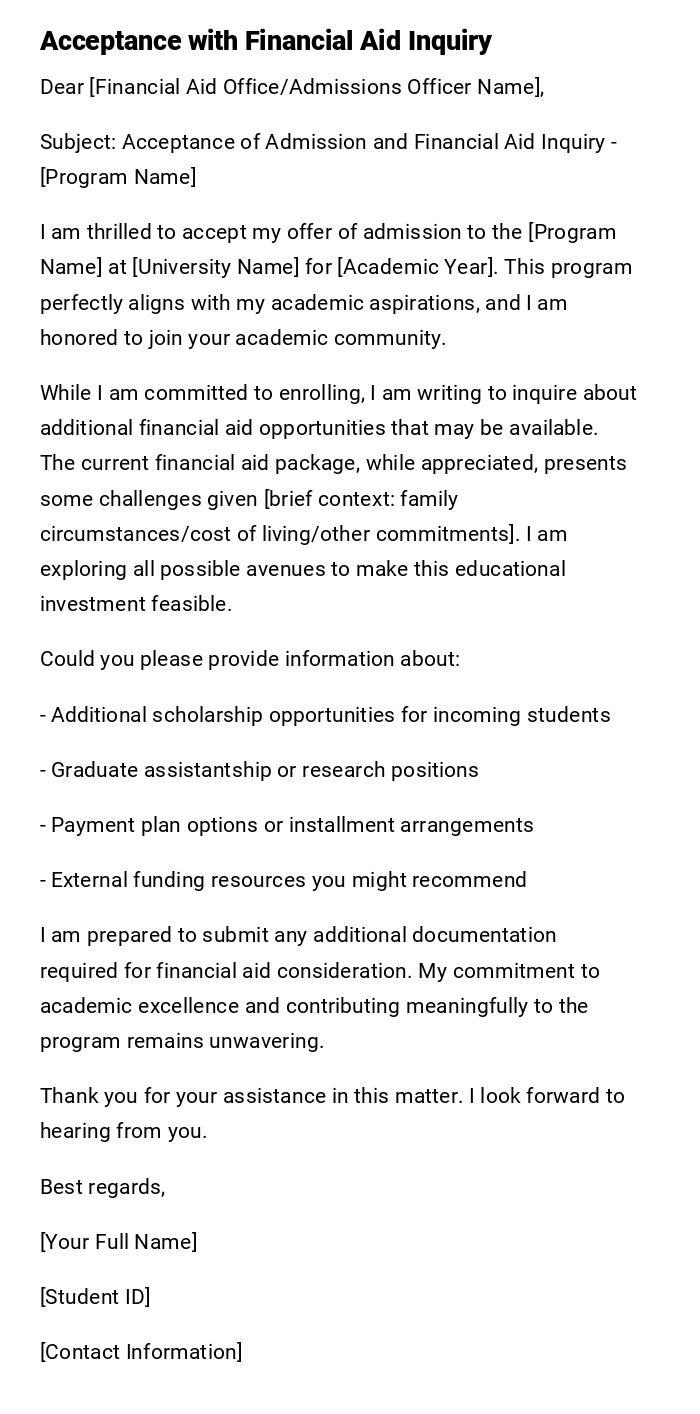
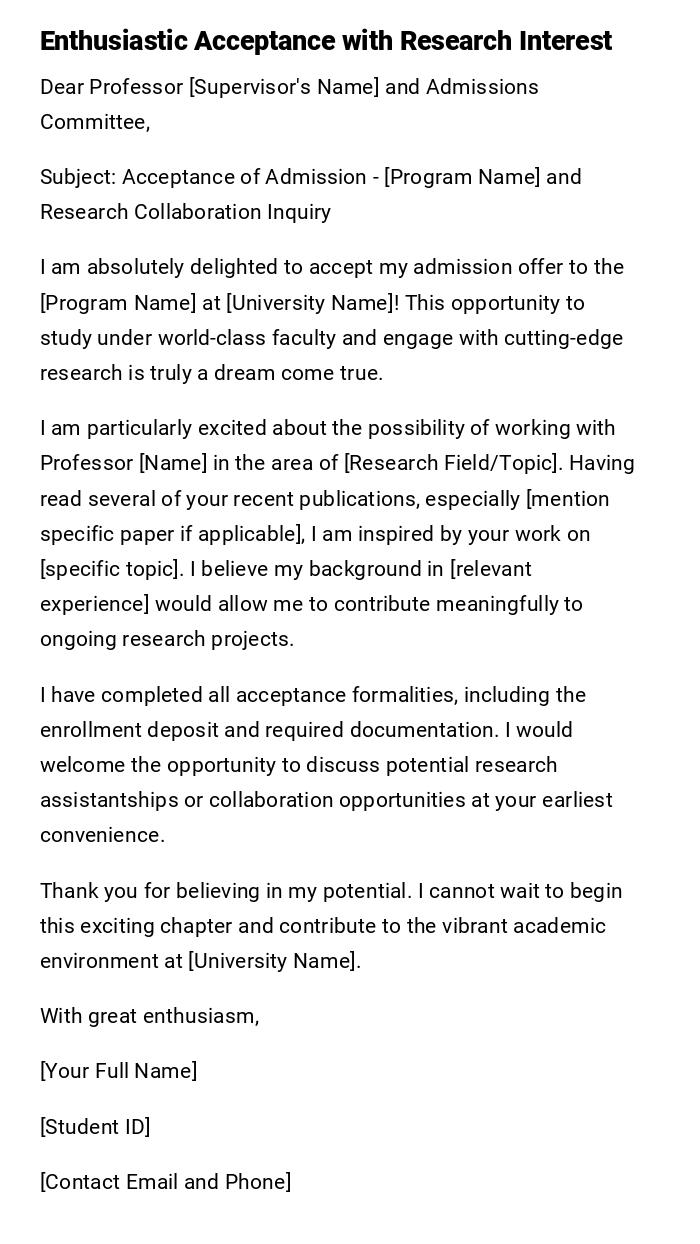
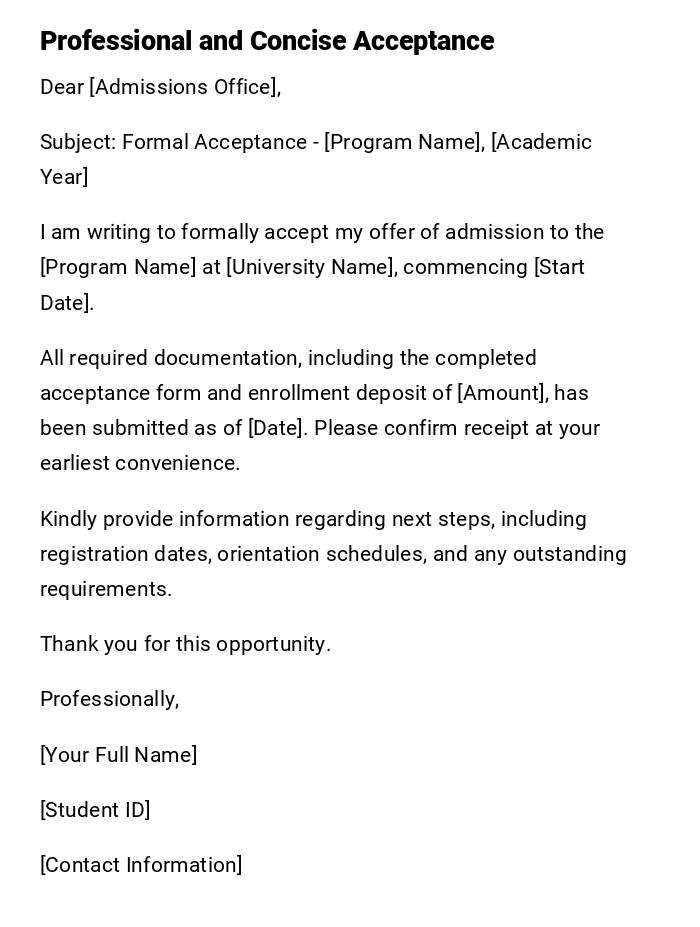
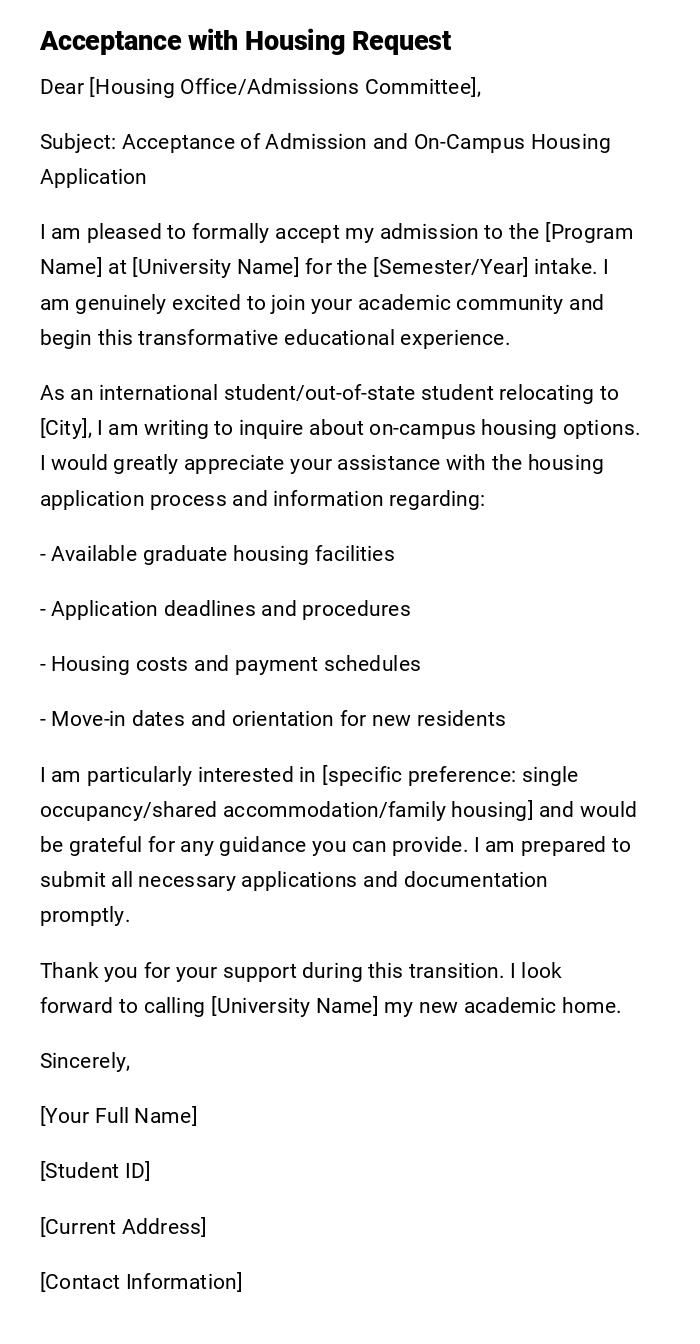
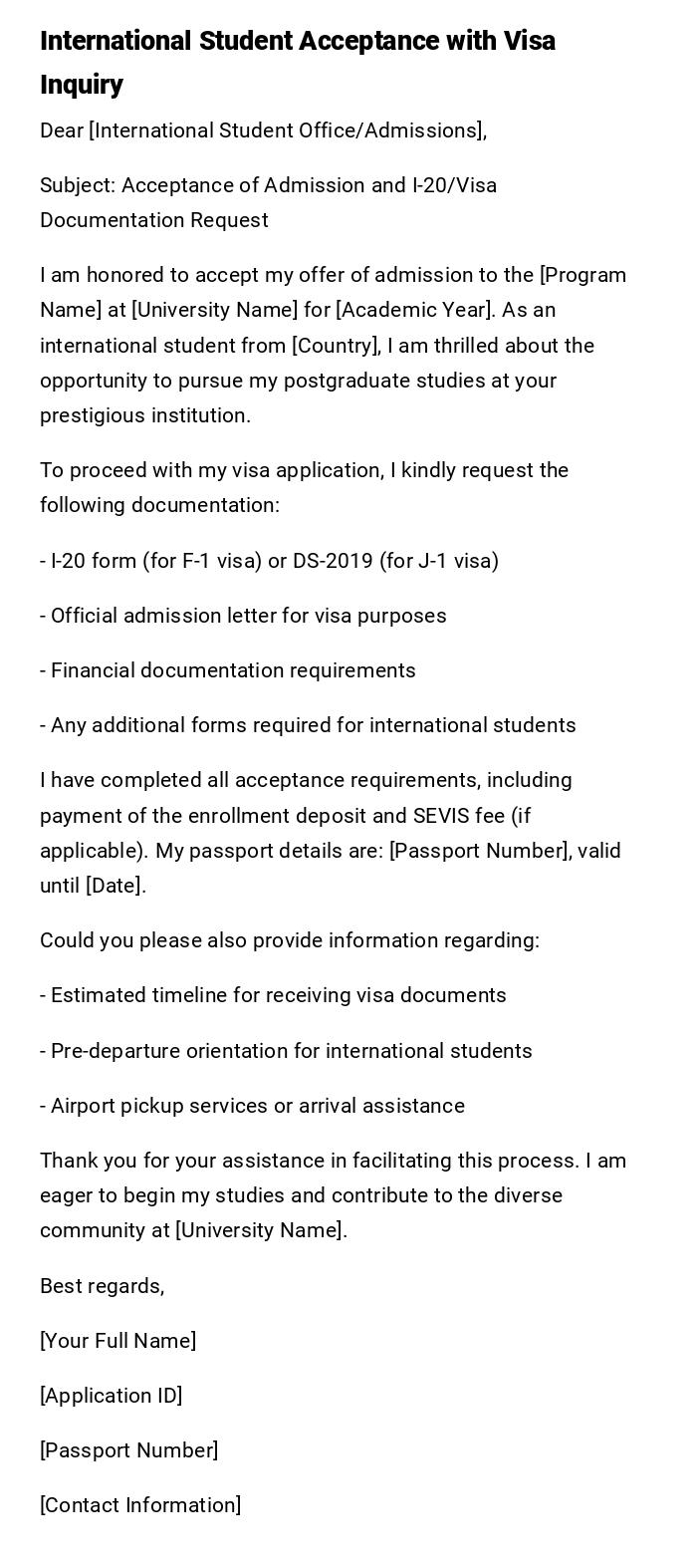
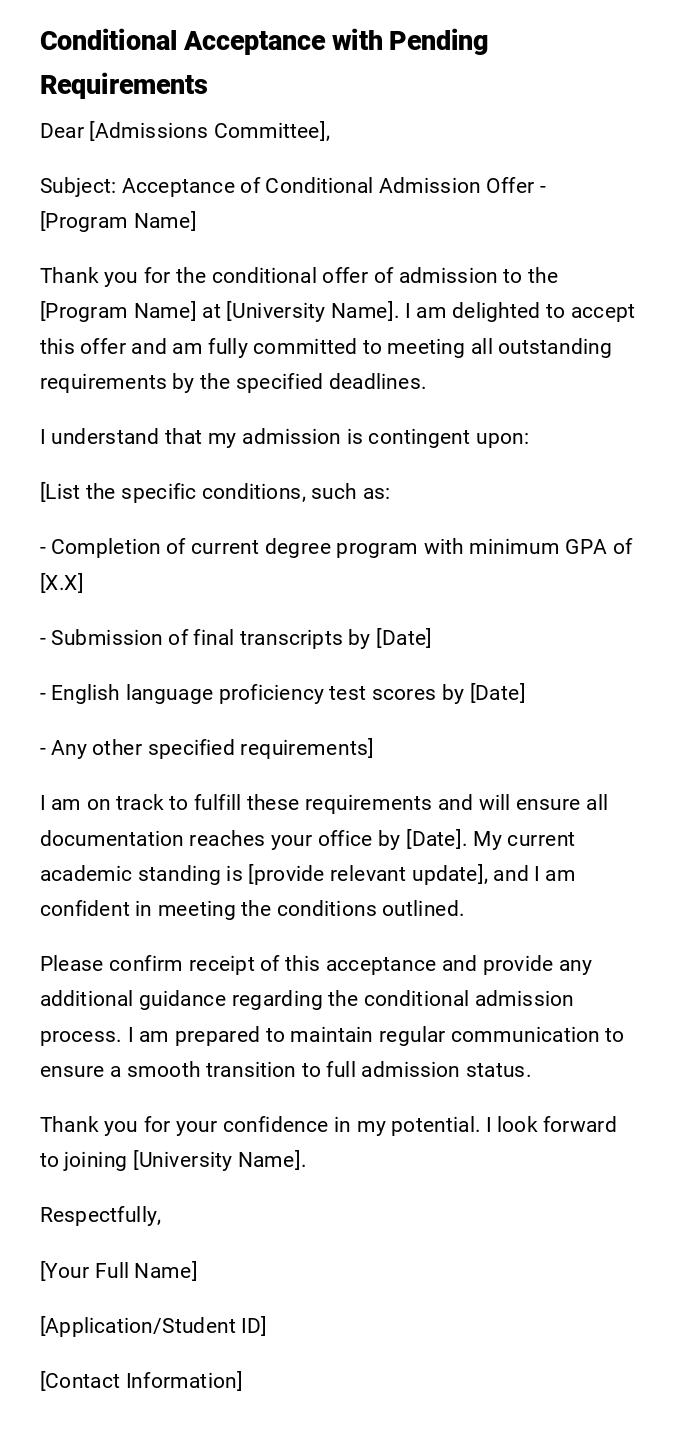

 Download Word Doc
Download Word Doc
 Download PDF
Download PDF